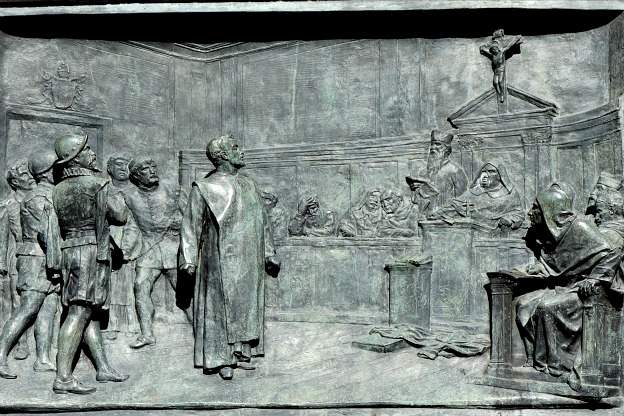
Giordano Bruno, a Dominican friar, astronomer, mathematician, and philosopher, was declared a heretic by Pope Clement VIII. Of chief offense to the Roman Catholic Church was Bruno's radical conception of the universe. Like Copernicus, Bruno understood that the earth orbited around the sun in a heliocentric system. Looking up at the night sky, the scholar posited an infinite number of stars, each the nexus of its own solar system. On February 17th, 1600, authorities burned Bruno at the stake, and his ashes were scattered in the Tiber River. Today, Bruno is hailed as a champion of radical scientific inquiry and uninhibited intellectualism.
In Florence, Euridice, an opera with music by Jacopo Peri, was published. The opera premiered at the Palazzo Pitti with Peri himself in the title role. Ottario Rinucci composed the libretto, basing its plot on the legend of Orpheus and Euridice. A number of Giulio Caccini's entourage took part in the initial production. Eventually, Caccini's own compositions were adopted into the opera. Considered to be the second example of modern opera after Peri's Dafne, Euridice incorporated an innovative blend of sung and spoken text. This approach reflected tenets of the Seconda Practica, which include a preponderance of dissonance, dramatic shifts in affect, and the elevation of text over music.
Euridice was composed in celebration of King Henry IV of France's marriage to Maria de Medici. For this reason, the figures Orpheus and Euridice have been paralleled with King Henry and his new bride. Some argue, however, that this particular comparison had little basis in reality. Henry and Maria suffered an unhappy marriage that culminated with the former's assassination in 1610. Following Henry's death, Maria served as regent for her son Louis XIII of France until he came of age.
1600 also marks the year that Scotland adopted use of Pope Gregory XIII's calendrical reform. The Julian calendar was exchanged for the Gregorian calendar; and celebration of the New Year was moved from March 25th to January 1st. This change to the calendar year accommodated the date of the vernal equinox and the subsequent celebration of Easter. England, Ireland, and the British colonies followed suit over a century later, with the passing of the Calendar Act.









